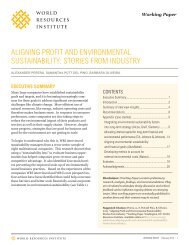Unleashing the Power of the Circular Economy
Unleashing the Power of the Circular Economy
Unleashing the Power of the Circular Economy
You also want an ePaper? Increase the reach of your titles
YUMPU automatically turns print PDFs into web optimized ePapers that Google loves.
4.4<br />
Start with<br />
stakeholder fora<br />
to set <strong>the</strong> agenda<br />
Consensus and<br />
support are<br />
growing<br />
More research<br />
reports are due...<br />
How to proceed<br />
The steps described above form a first roadmap into this uncharted territory.<br />
To set <strong>the</strong> wheels in motion and transform <strong>the</strong> steps into an agenda for<br />
coordinated actions by specific stakeholders requires <strong>the</strong> initiation <strong>of</strong><br />
stakeholder fora (see step 9). The combined effect <strong>of</strong> <strong>the</strong> steps described will<br />
greatly accelerate <strong>the</strong> transition towards a circular economy. Even when <strong>the</strong><br />
removal <strong>of</strong> some <strong>of</strong> <strong>the</strong> obstacles would be only partially successful or takes<br />
more time, <strong>the</strong> effects on our economy would still be significant.<br />
Besides showing <strong>the</strong> potential for circular business models, front-running<br />
companies should urge governments to change rules and regulations in<br />
favour <strong>of</strong> <strong>the</strong>se business models. Only <strong>the</strong>n has every economic sector <strong>the</strong><br />
incentive to become regenerative by design. Such incentives will need to be<br />
knowledge based and have to acceptable to society at large. This implies an<br />
important role for knowledge institutes and NGOs if we want <strong>the</strong> circular<br />
economy to become mainstream.<br />
Fortunately, consensus and support for <strong>the</strong> circular economy are growing.<br />
Governments increasingly acknowledge <strong>the</strong> need for a circular economy.<br />
China was one <strong>of</strong> <strong>the</strong> first countries integrating <strong>the</strong> circular economy into<br />
its national policies (5-year plan), in order to prepare itself for resource<br />
scarcity. [93] Germany has included circular economy regulation in its policy<br />
to address future scarcity [70] , while <strong>the</strong> European Union has similar intentions<br />
with its resource efficiency policy. [85] The Dutch government announced <strong>the</strong><br />
importance <strong>of</strong> <strong>the</strong> circular economy in its latest coalition agreement. [135]<br />
A recent development in <strong>the</strong> Ne<strong>the</strong>rlands is that industry confederation<br />
VNO-NCW now supports <strong>the</strong> concept.<br />
To provide fur<strong>the</strong>r guidance towards <strong>the</strong> circular economy, several studies<br />
are being carried out by o<strong>the</strong>r parties in parallel to writing this report. In <strong>the</strong><br />
Ne<strong>the</strong>rlands alone, three studies have recently been commissioned: one<br />
concerning existing regulatory obstacles for companies and two on <strong>the</strong><br />
opportunities for <strong>the</strong> Dutch economy. Finally, <strong>the</strong> Ex’Tax foundation is working<br />
with <strong>the</strong> “Big Four” audit firms to investigate <strong>the</strong> possibility <strong>of</strong> a tax shift from<br />
labour to natural resources. [110]<br />
29



